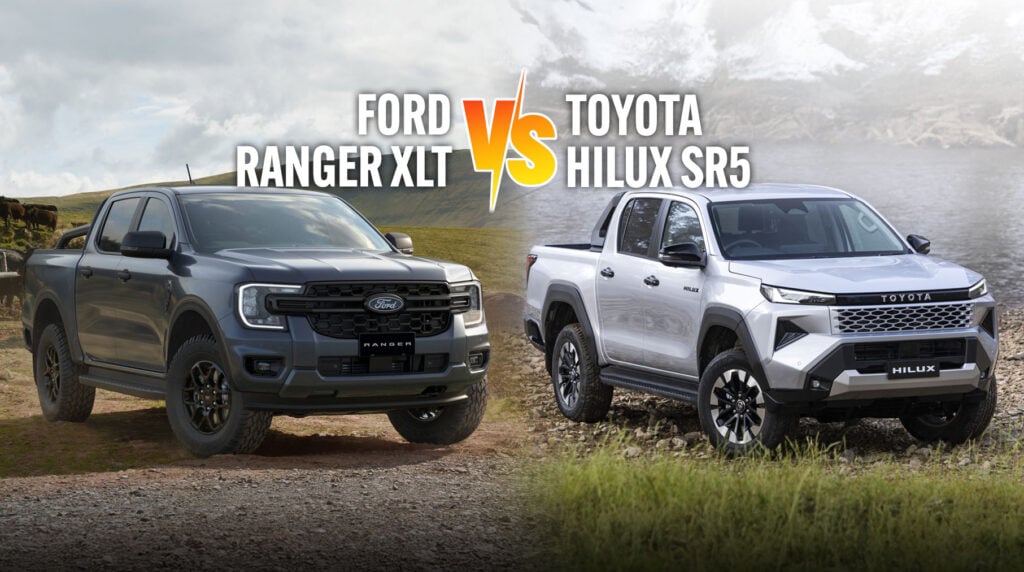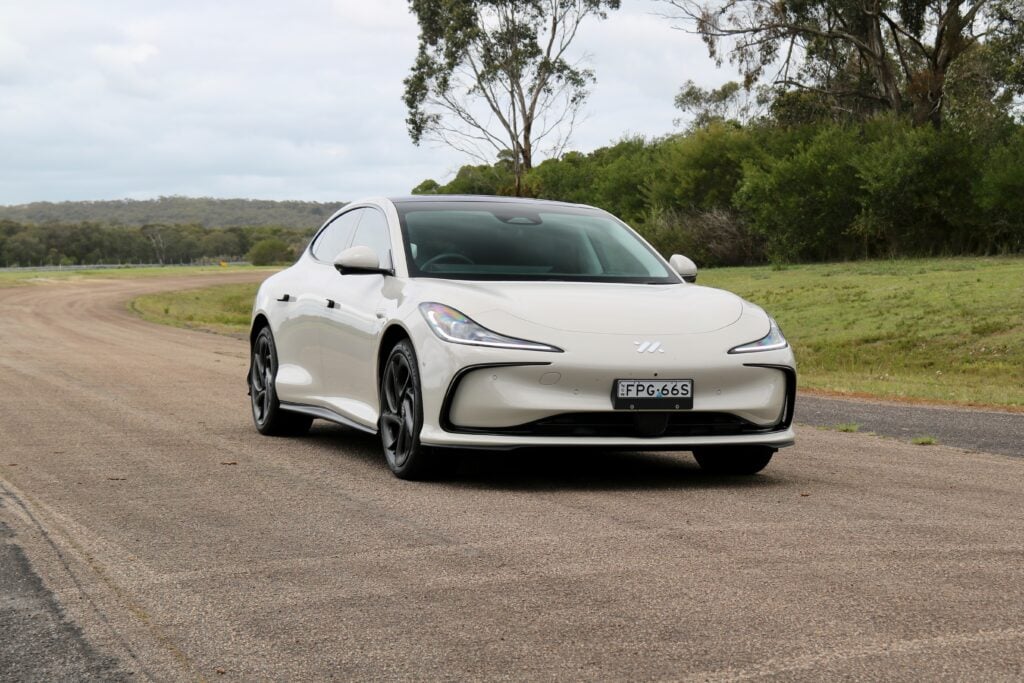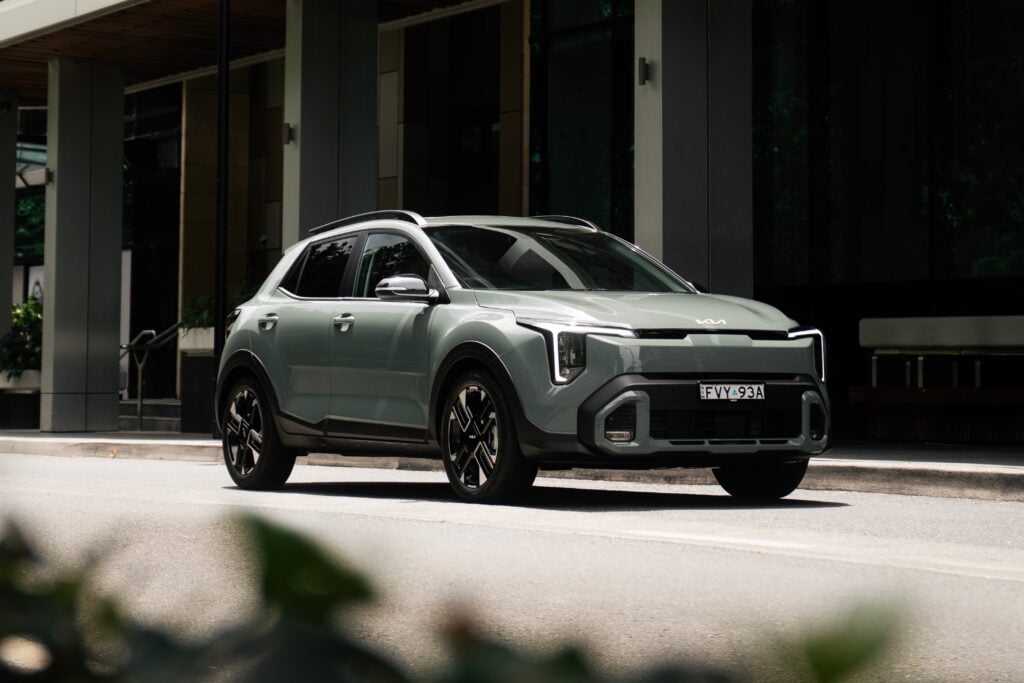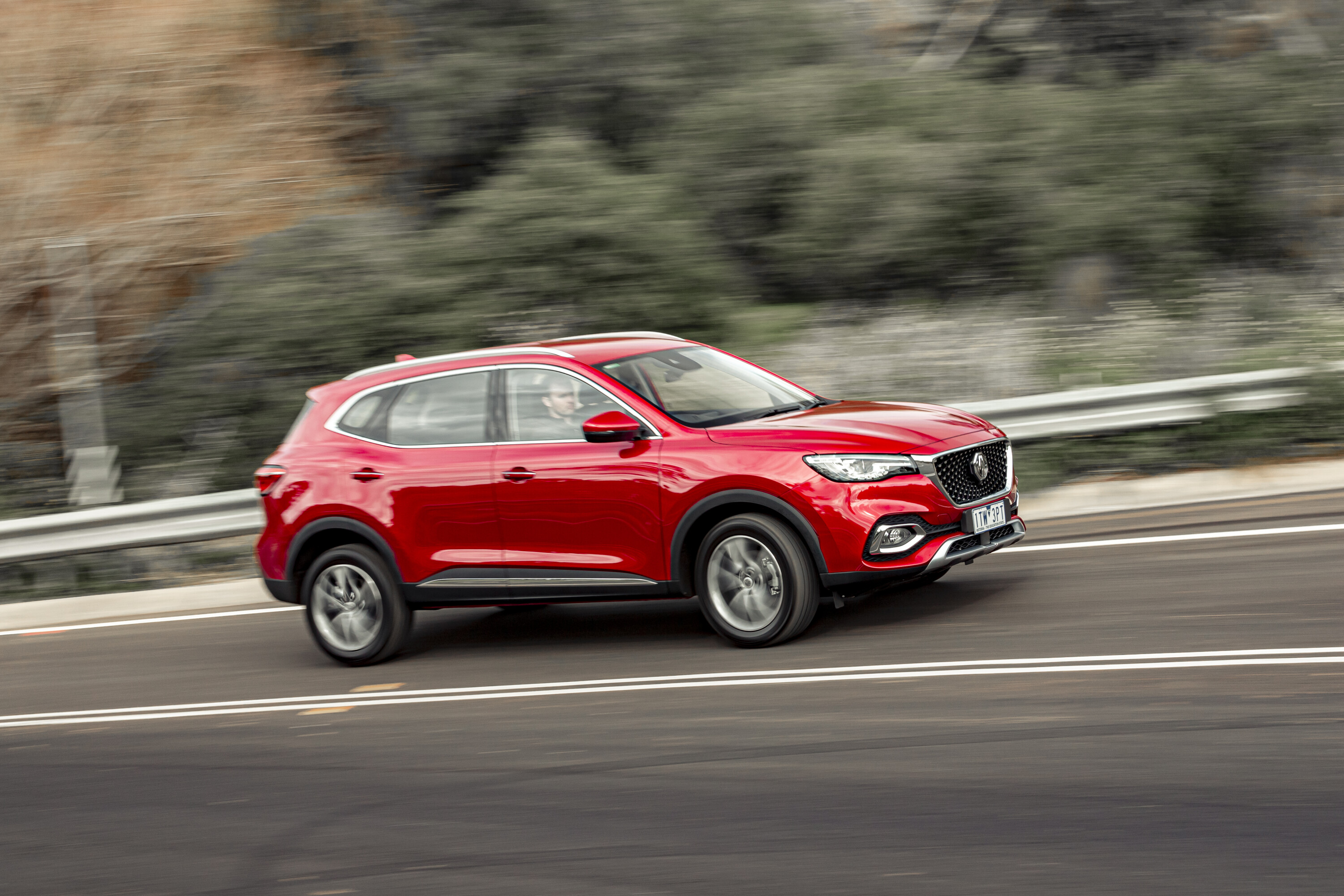
Score breakdown
Things we like
- Well equipped for the price
- Pleasing interior materials
- Willing turbocharged engine
- Australia's most affordable PHEV
Not so much
- Laggy dual-clutch auto
- Not-so-refined ride and handling
- Fiddly touchscreen controls
- Thirsty all-wheel-drive variant
The MG HS provides good value in terms of pricing and features, including premium look-and-feel interiors and a range of driver assistance features.
Its sharp drive-away pricing aligns the affordability of this medium SUV with many small SUV ranges and while some things need improving, build quality doesn’t seem to be one of them.
Neither is performance; the HS comes with a punchy 1.5-litre and 2.0-litre turbocharged powertrains, including Australia’s cheapest plug-in hybrid.
JUMP AHEAD
- Pricing
- What body styles are available for the MG HS?
- What features are standard in every MG HS?
- What key features do I get if I spend more?
- How comfortable and practical is the MG HS?
- How much boot space does the MG HS offer?
- I like driving – will I enjoy this car?
- Which MG HS engine uses the least fuel?
- How does the hybrid system work in the MG HS?
- What is the MG HS’s towing capacity?
- How long is the warranty and what are the MG HS’s servicing costs?
- Which version of the MG HS does Wheels recommend?
- What are the MG HS’s key rivals?
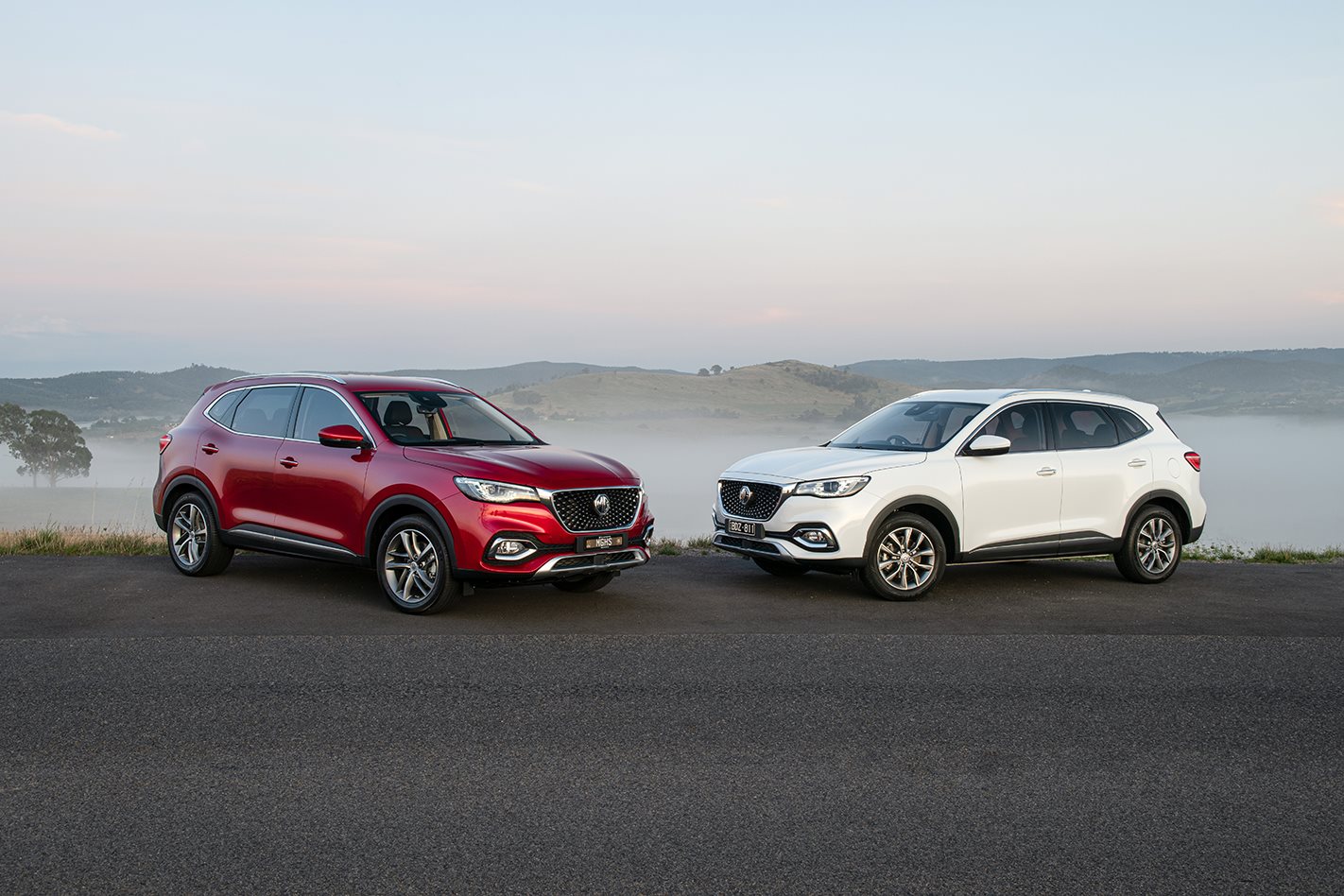
MG HS pricing
| Model | Drive-away pricing |
|---|---|
| HS Vibe FWD | $32,990 |
| HS Excite FWD | $35,990 |
| HS Essence FWD | $39,990 |
| HS Essence X AWD | $43,990 |
| HS Plus EV Excite FWD | $49,690 |
| HS Plus EV Essence FWD | $53,690 |
What body styles are there?
The MG HS is sold as a five-door SUV-style wagon only, with seating for five.The MG HS is available with front- and all-wheel-drive and is classed as a medium SUV, in the mainstream sub-$60K segment.
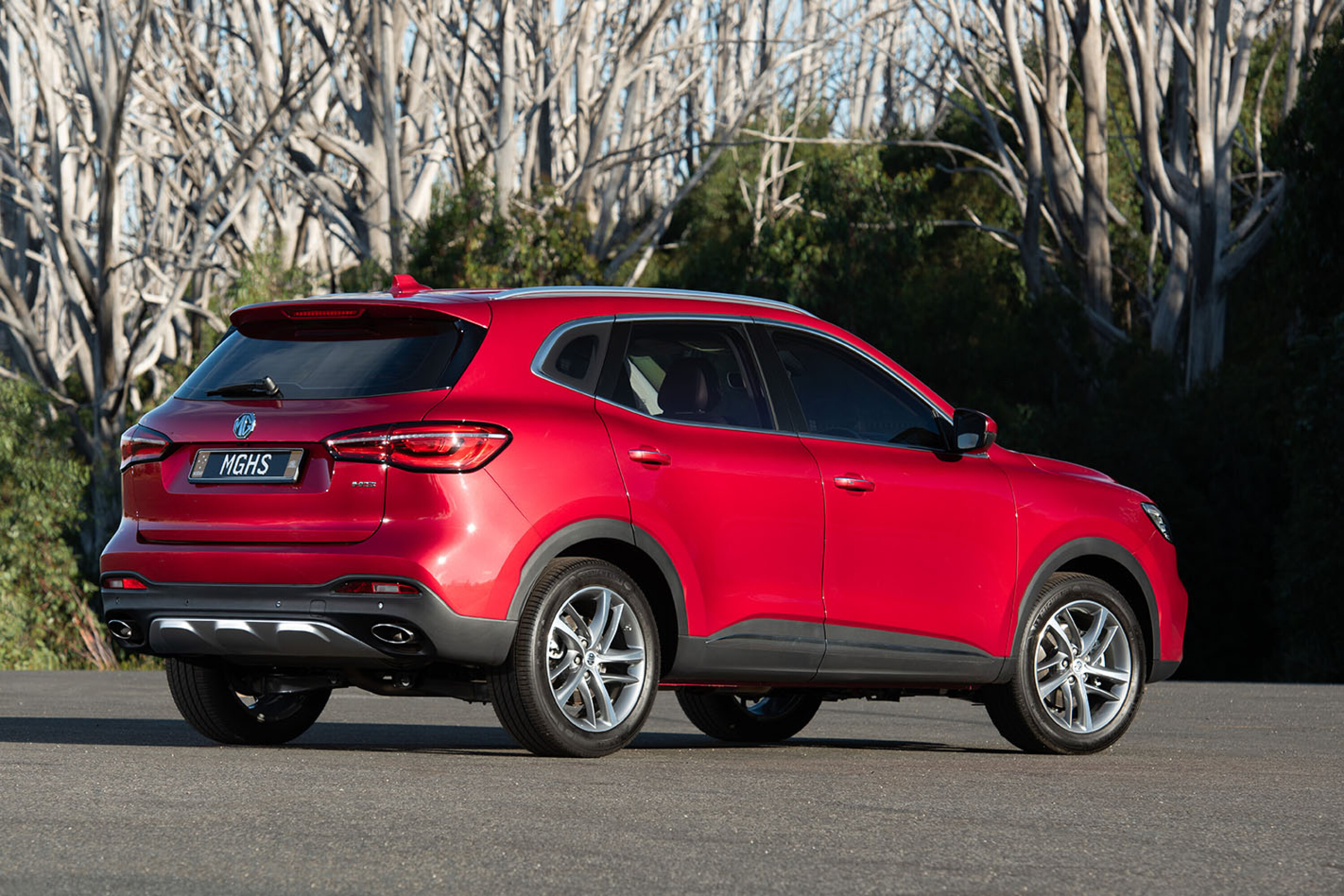
What features are in every MG HS?
The features listed below are standard in the entry-level model and will appear in higher-grade models, unless replaced by more premium equivalent features.
| 2024 MG HS standard features | |
|---|---|
| 10.1-inch infotainment system | Apple CarPlay and Android Auto (wired only) |
| Semi-digital instrument cluster | Six-speaker audio system |
| Reverse camera | Rear parking sensors |
| Four USB-A ports (2x front and rear) | Air conditioning |
| Synthetic leather upholstery | Leather-wrapped steering wheel and gear shifter |
| Front centre console with cooling | Rear air vents |
| Halogen headlights | Front fog lights |
| LED daytime running lamps | LED tail lights |
| Keyless entry with push-button start | Heated, electrically-operated door mirrors. |
| Alloy wheels | Sharkfin antenna |
| MG Pilot Driver Safety Suite | Adaptive cruise control |
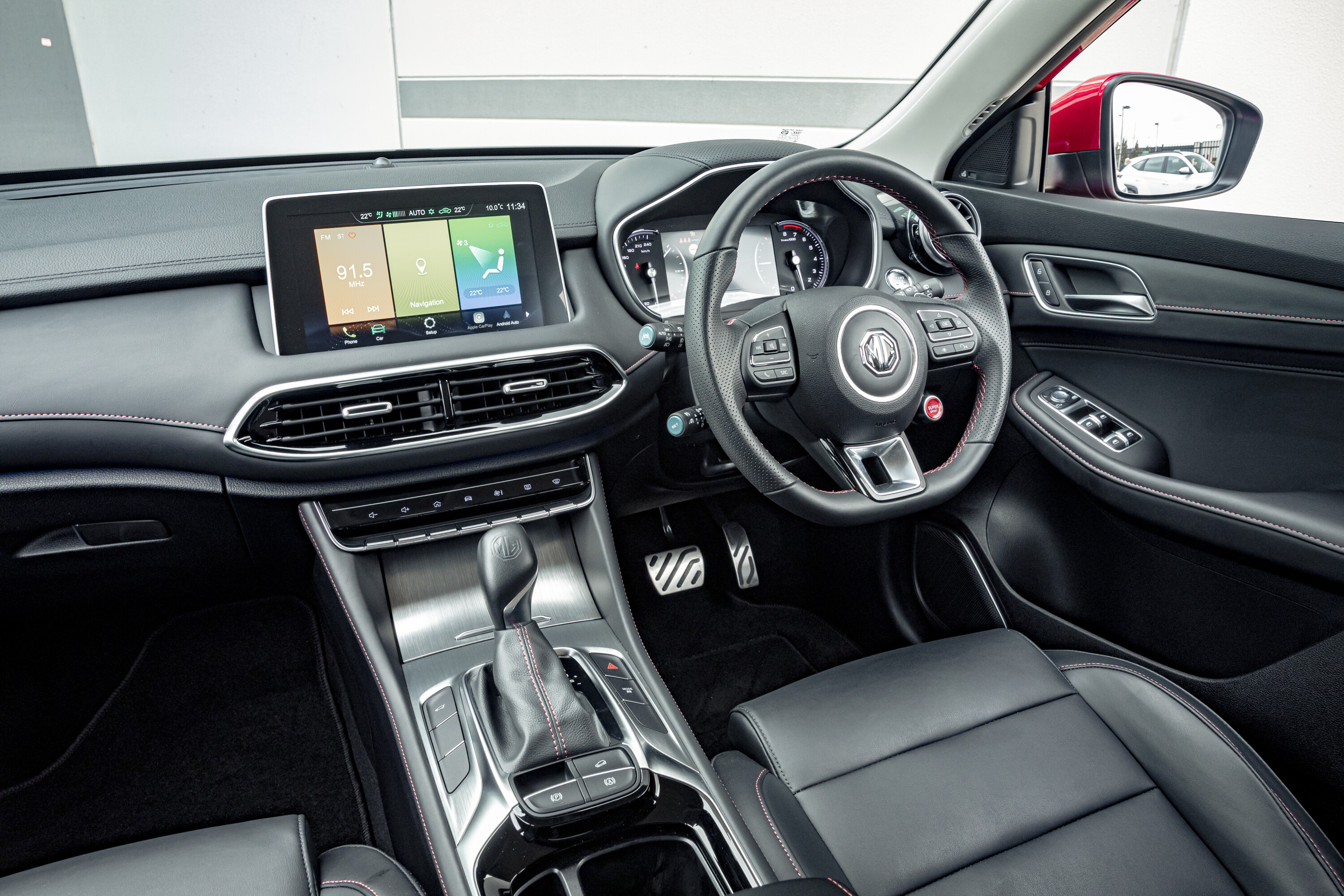
What key features do I get if I spend more?
The least costly MG HS is the Vibe, which comes with 17-inch wheels, manually operated air-conditioning, halogen headlights and front-wheel drive.
Stepping up to the HS Excite brings a bunch of desirable extras:
| 2024 MG HS Excite additional features | |
|---|---|
| LED headlights | Dual-zone climate control |
| Satellite navigation | Alloy pedals |
| Rain-sensing wipers | u2018Super Sportu2019 drive mode |
| Electric tailgate | Paddle shifters |
| Sequential rear indicators | Ambient interior lighting. |
| 18-inch alloy wheels | |
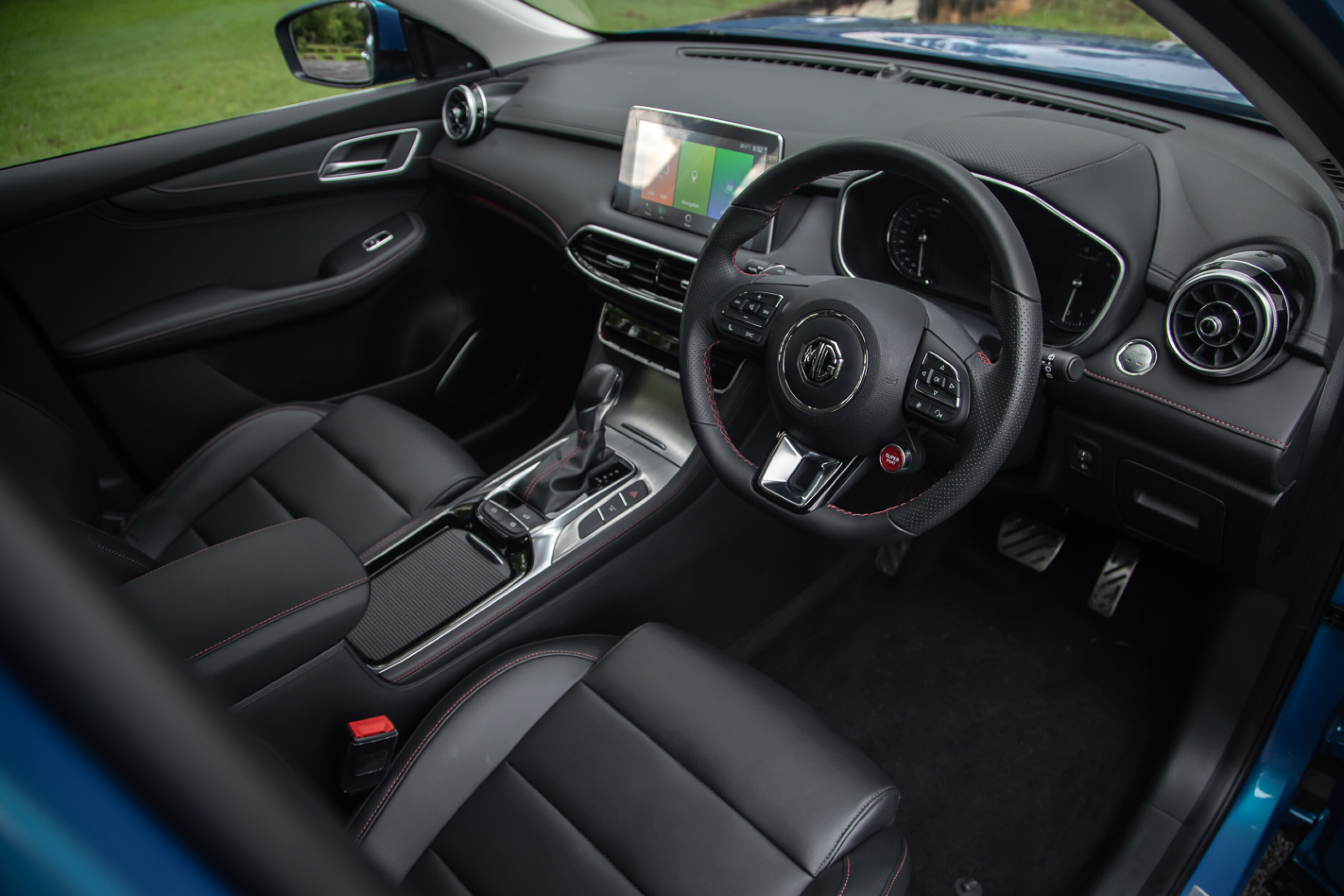
The top-spec HS Essence is available with the standard front-wheel drive, and an all-wheel-drive variant called the Essence X comes with a more powerful 2.0-litre turbocharged engine.
| 2024 MG HS Essense additional features | |
|---|---|
| 360-degree camera | Panoramic sunroof |
| Two-tone leather sports seats | Six-way power-adjustable driveru2019s seat |
| Heated front seats | Four-way power-adjustable passenger seat |
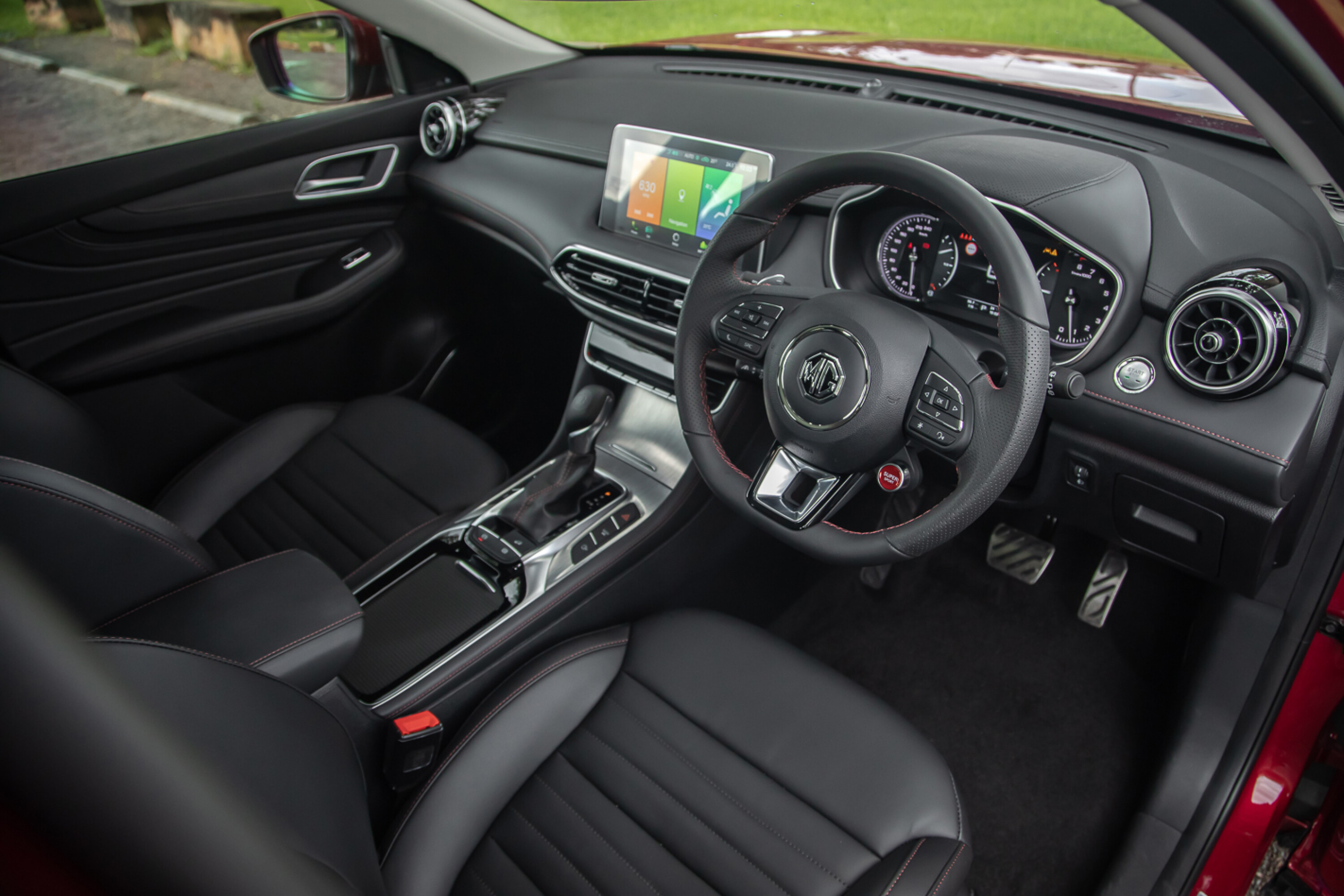
The HS Plus EV Excite is the most-affordable plug-in hybrid version.
It has most of Excite’s features but has smaller 17-inch wheels and a manually-operated tailgate and, for some reason, old-school halogen headlights which seems an odd choice in a high-tech electrified vehicle. But it gains the 12.3-inch digital instrument cluster found in the Essence.
The HS Plus EV Essence shares much with its petrol Essence and Essence X counterparts – including the 18-inch wheels and LED headlights – while gaining the digital dials and leather trim.
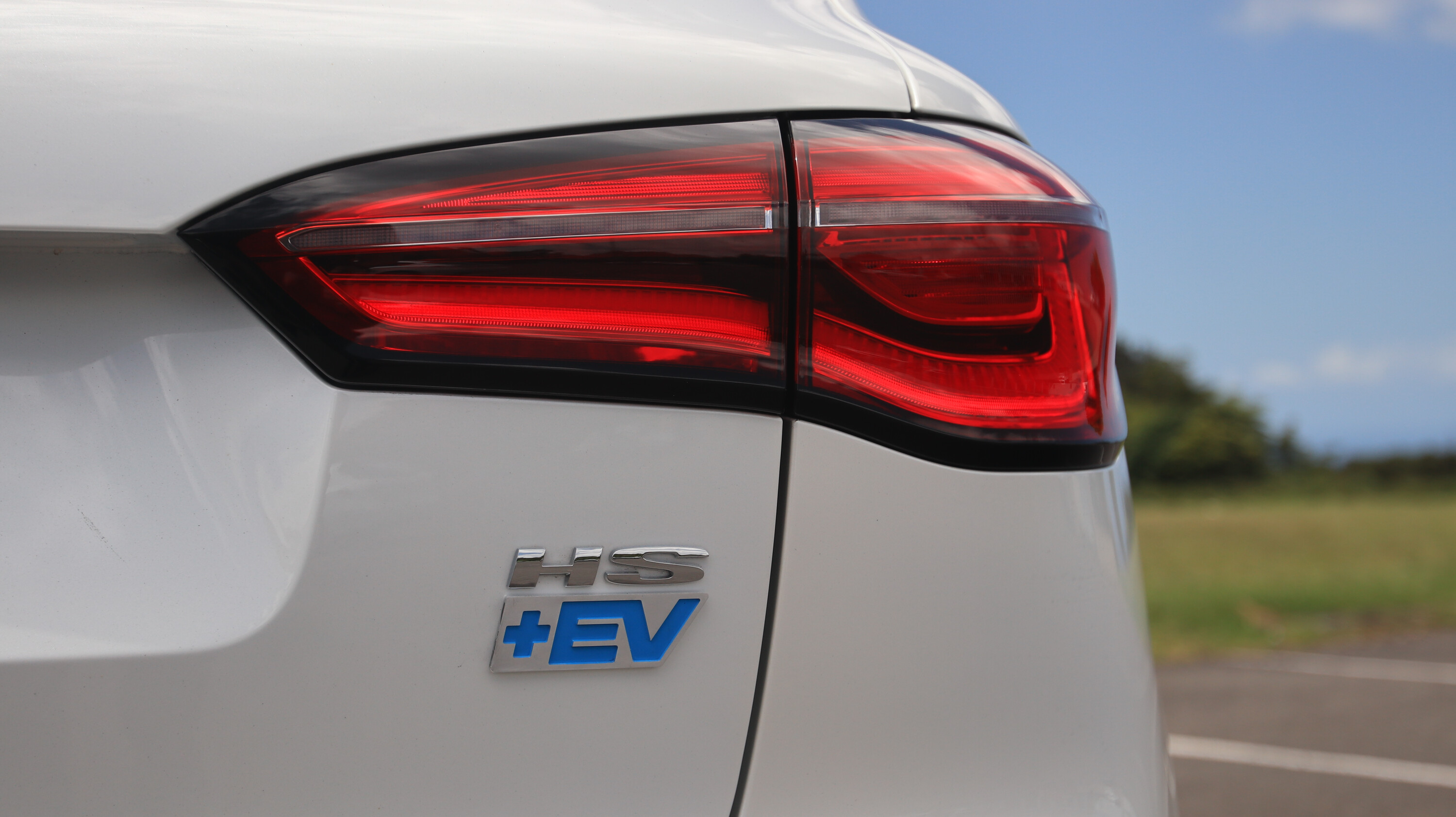
How safe is the MG HS?
The non-hybrid MG HS is covered by a five-star ANCAP safety rating, based on Euro-NCAP testing conducted in 2019.
Plug-in hybrid variants remain untested and unrated.
Six airbags (dual front, dual side and dual curtain) feature across the range.
Each variant comes with the MG Pilot driver safety suite, which brings the following active safety equipment as standard:
| 2024 MG HS safety features | |
|---|---|
| Autonomous emergency braking | Lane-keep assist |
| Forward collision warning | Adaptive cruise control |
| Traffic jam assist | Blind-spot alert |
| Rear-cross traffic alert | Traffic sign recognition |
| Auto high-beam | Door opening warning |
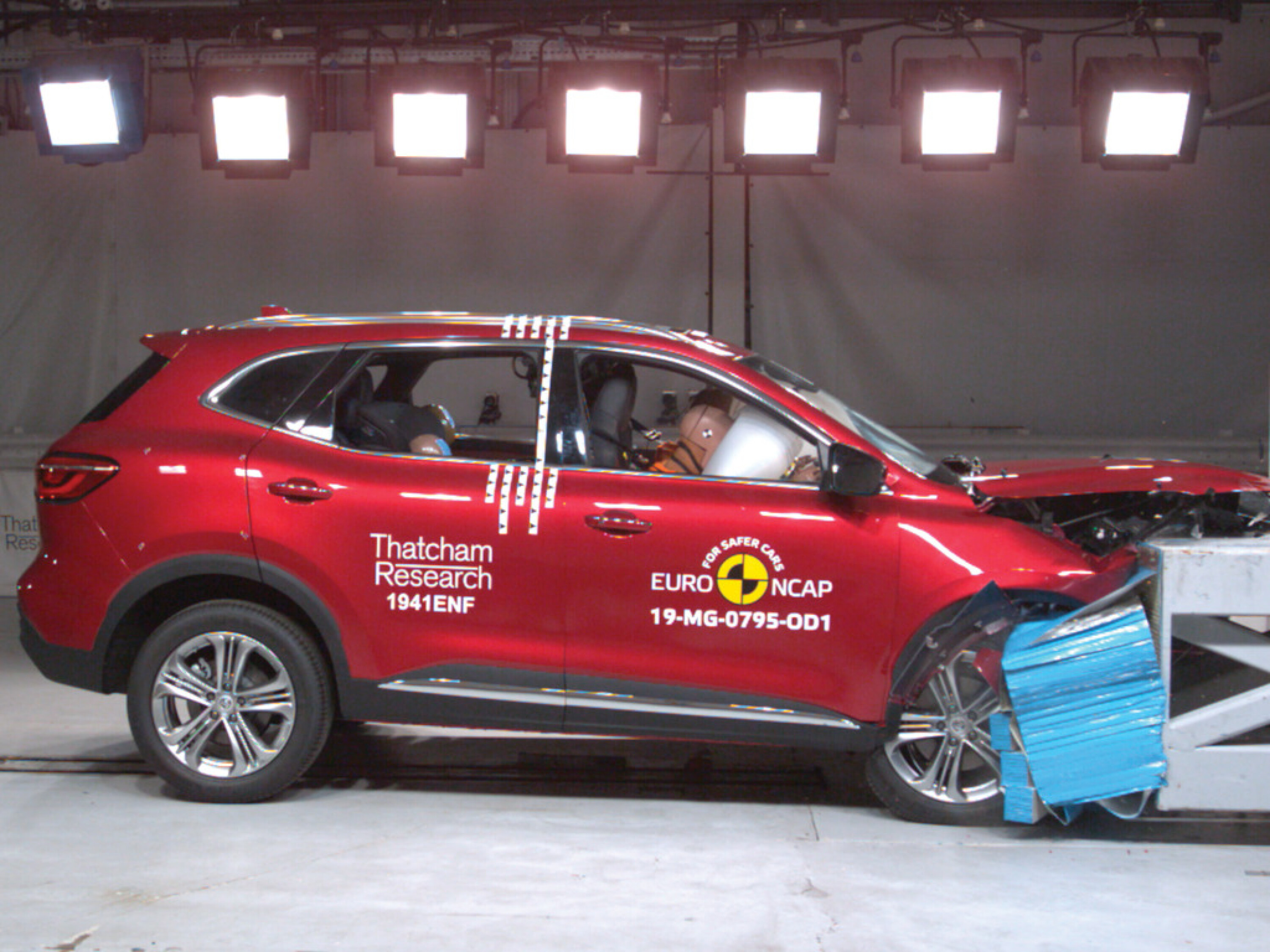
How comfortable and practical is the MG HS?
Even in the entry-level Vibe, with its faux leather seats, the HS interior feels surprisingly premium.
All variants feature plenty of soft-touch materials, supportive front seats, a 10.1-inch touchscreen and a leather-wrapped steering wheel that wouldn’t be out of place in a European rival.
The fit and finish of trims, carpets and switchgear is also pleasing and the cabin is well insulated from road and wind noise, contributing to a quality feel inside.
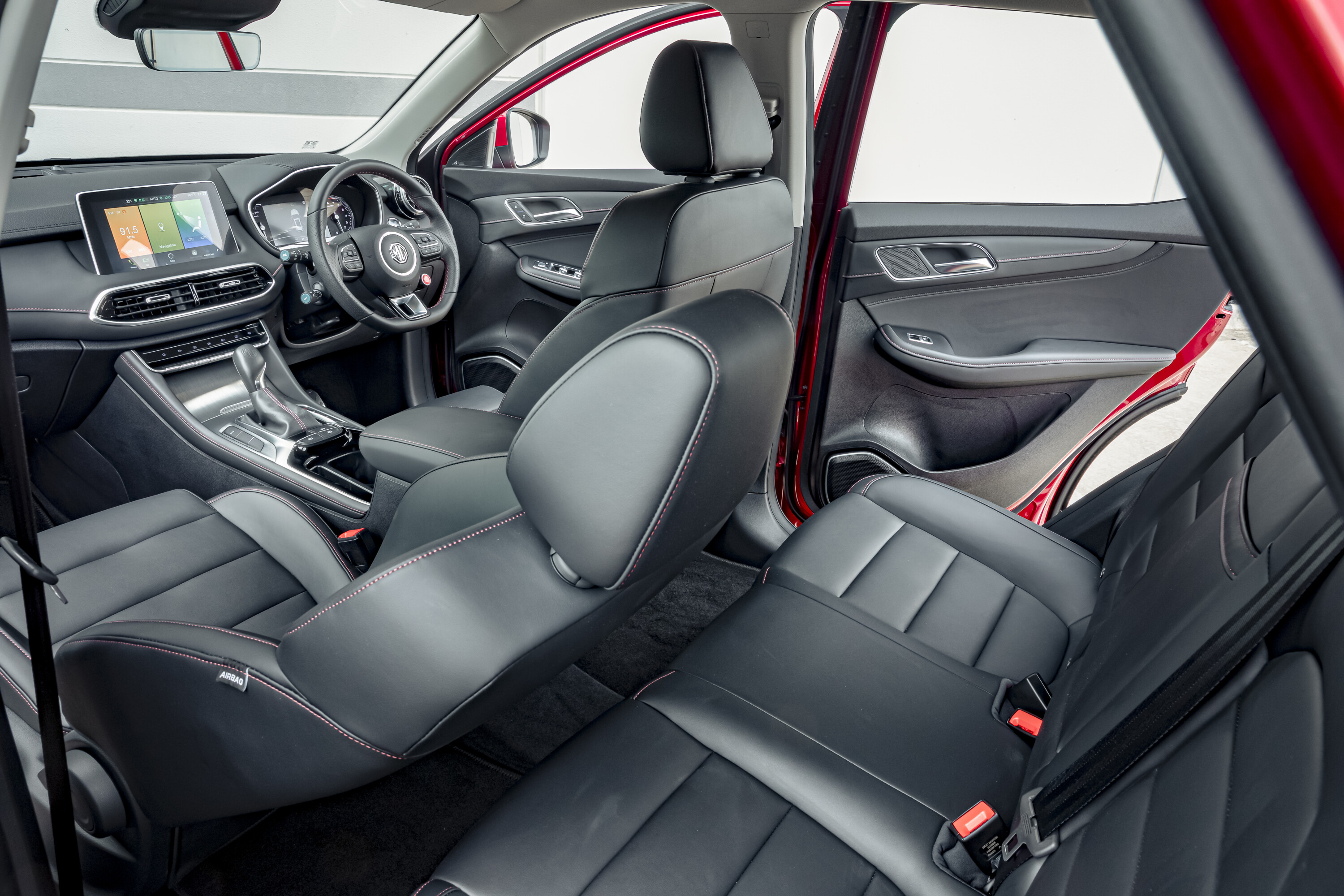
The Apple CarPlay and Android Auto interface connects and works well, but there are a few niggly issues with the infotainment system such as the interplay between the touchscreen and the buttons below that isn’t always intuitive or speedy.
A bunch of functions that would have physical buttons in other vehicles are also hosted within the touchscreen, including climate control, which can be difficult to adjust while on the move.
To make things a little easier, there is a shortcut button on the main menu to go straight to the climate control display.
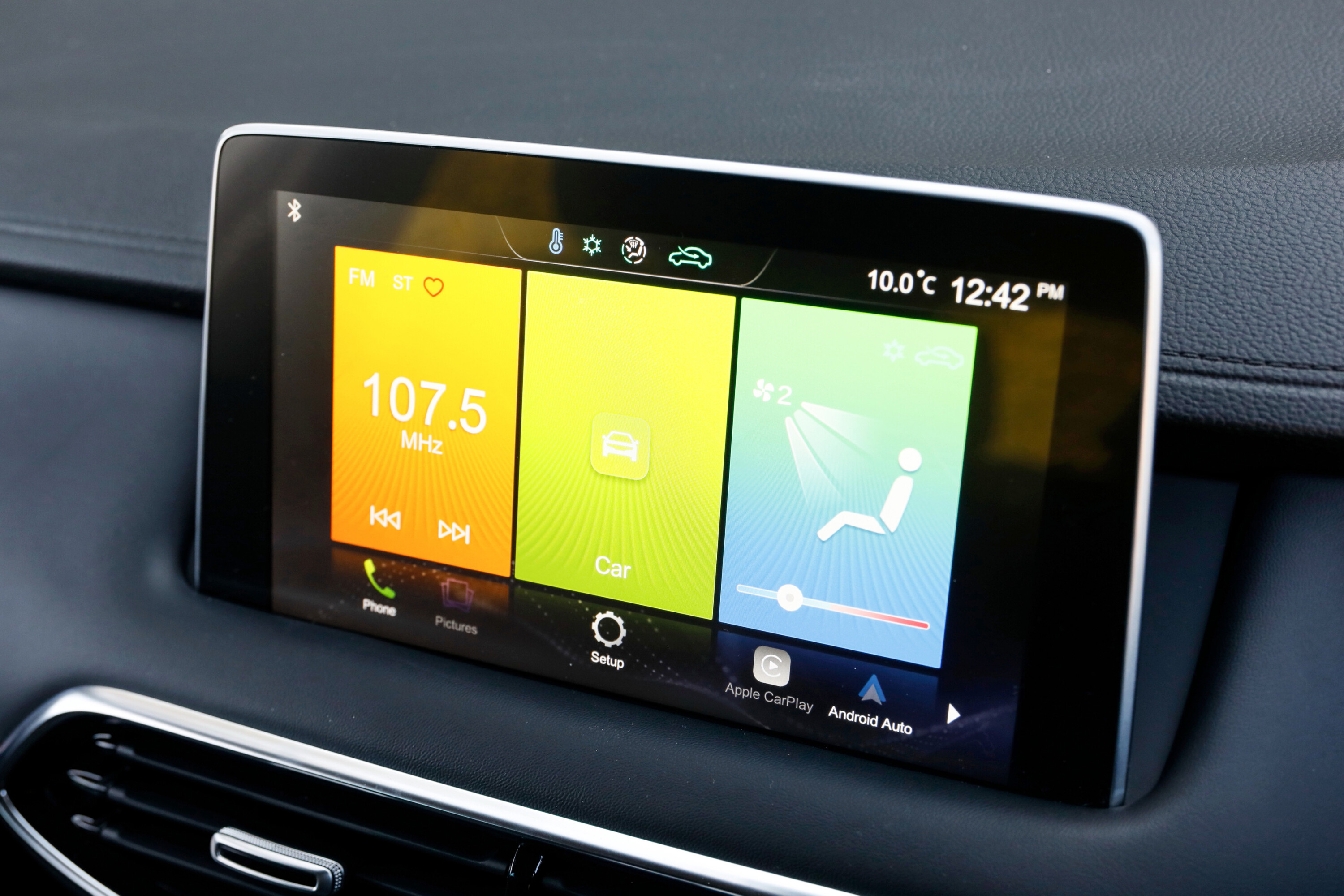
In front of the driver are clear dials, complemented by a central digital screen that displays the fuel and temperature gauges along with all manner of vehicle information that is easily navigated using the steering wheel buttons.
The leather-trimmed steering wheel feels comfortable to hold and looks like it was lifted from a Mark 6 Volkswagen Golf.
In the hybrids, the driver’s 12.3-inch digital instrument display can be configured to provide various info pages showing fuel and energy consumption, motor and engine speeds, or energy flow.
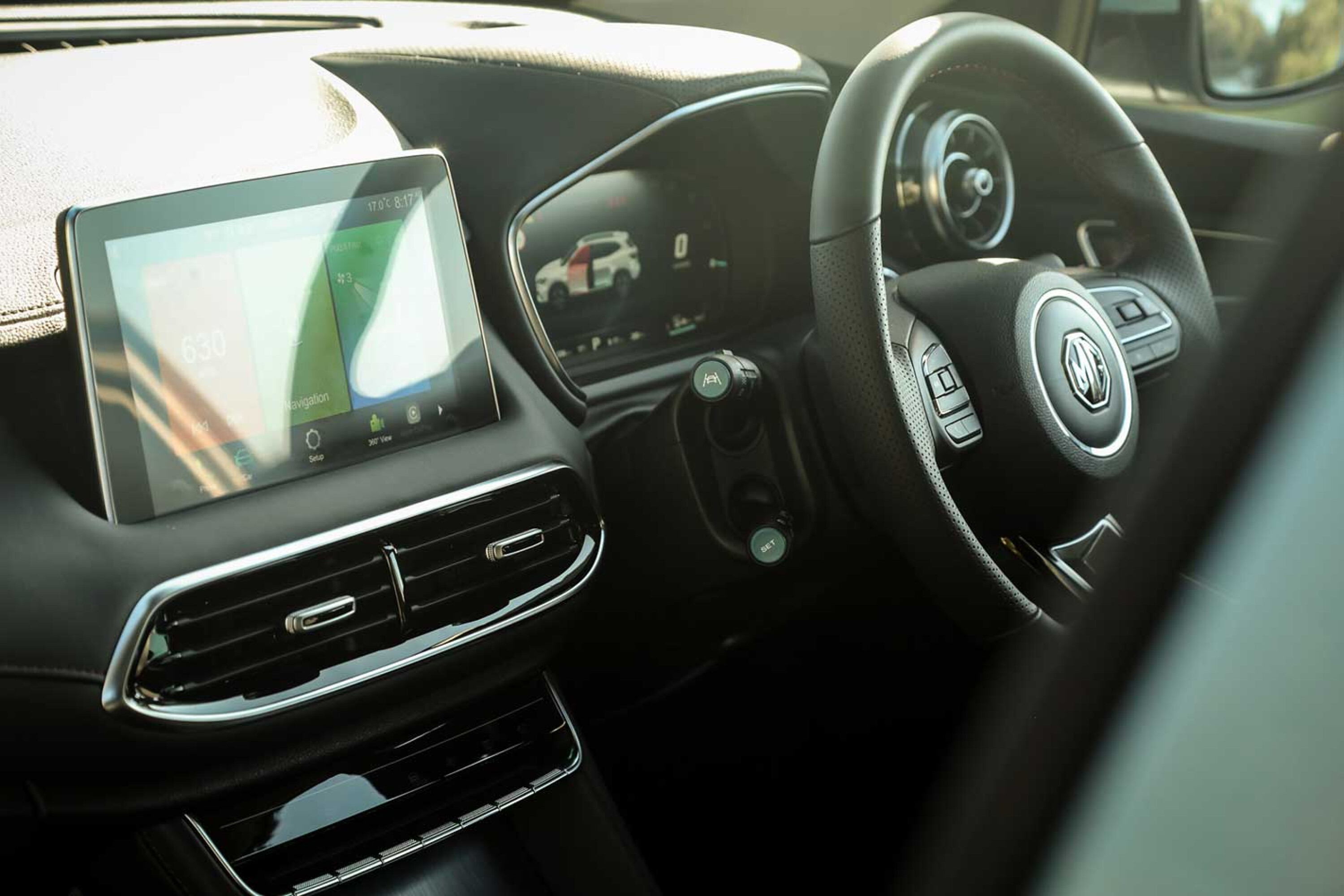
Second-row comfort
Rear passengers are well catered for, with a two-position (slightly) reclining 60:40 split seat, fold-down centre armrest with cup holders, air vents and twin USB ports.
There is ample legroom but a lack of under-thigh support – not just for long-legged occupants.
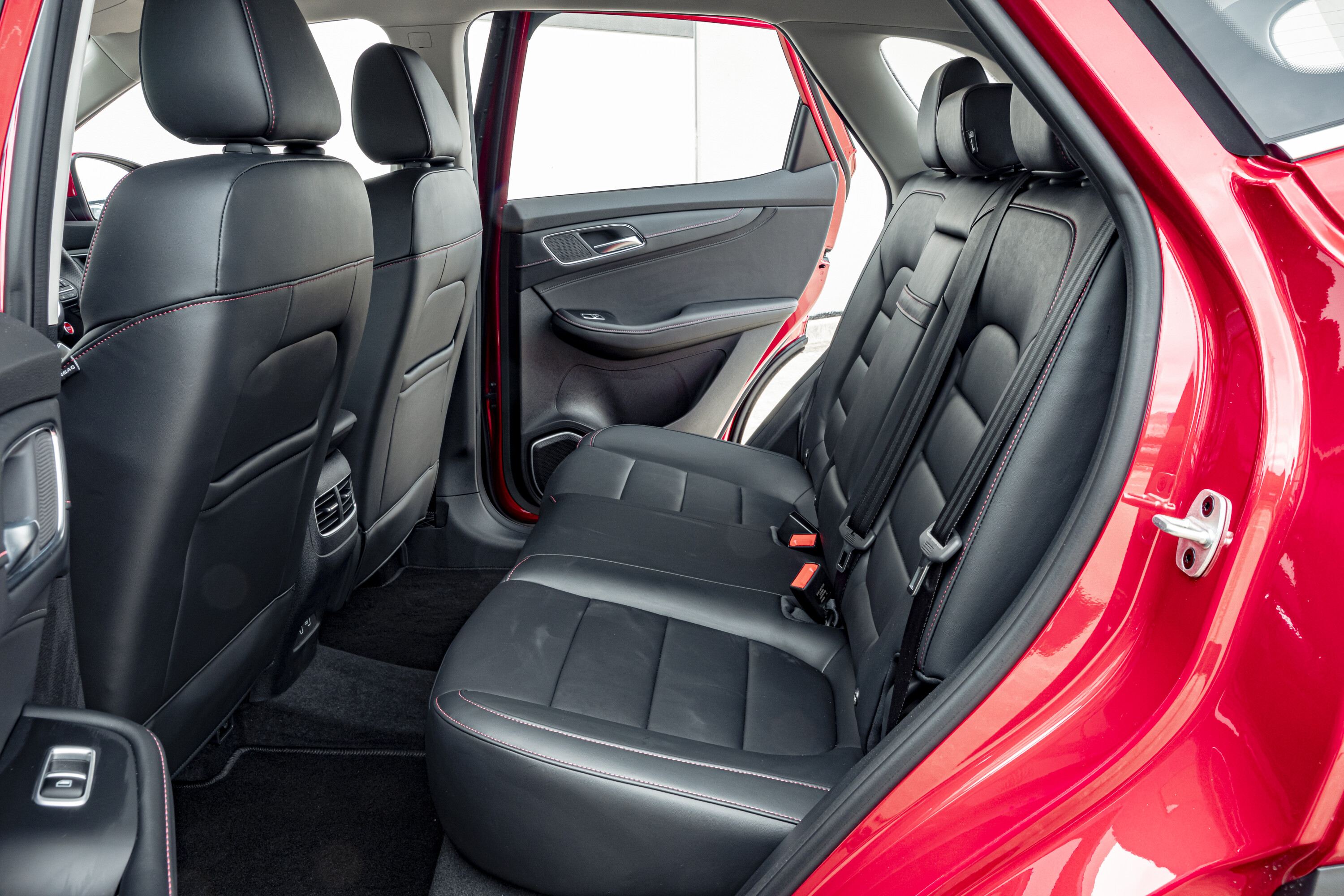
How much boot space does the MG HS offer?
The MG HS can hold 463 litres of stuff in its boot, which is about average for a medium SUV.
Folding the rear seats down can net you up to 1287 litres of space.
Each variant comes with a storage compartment and luggage cover.
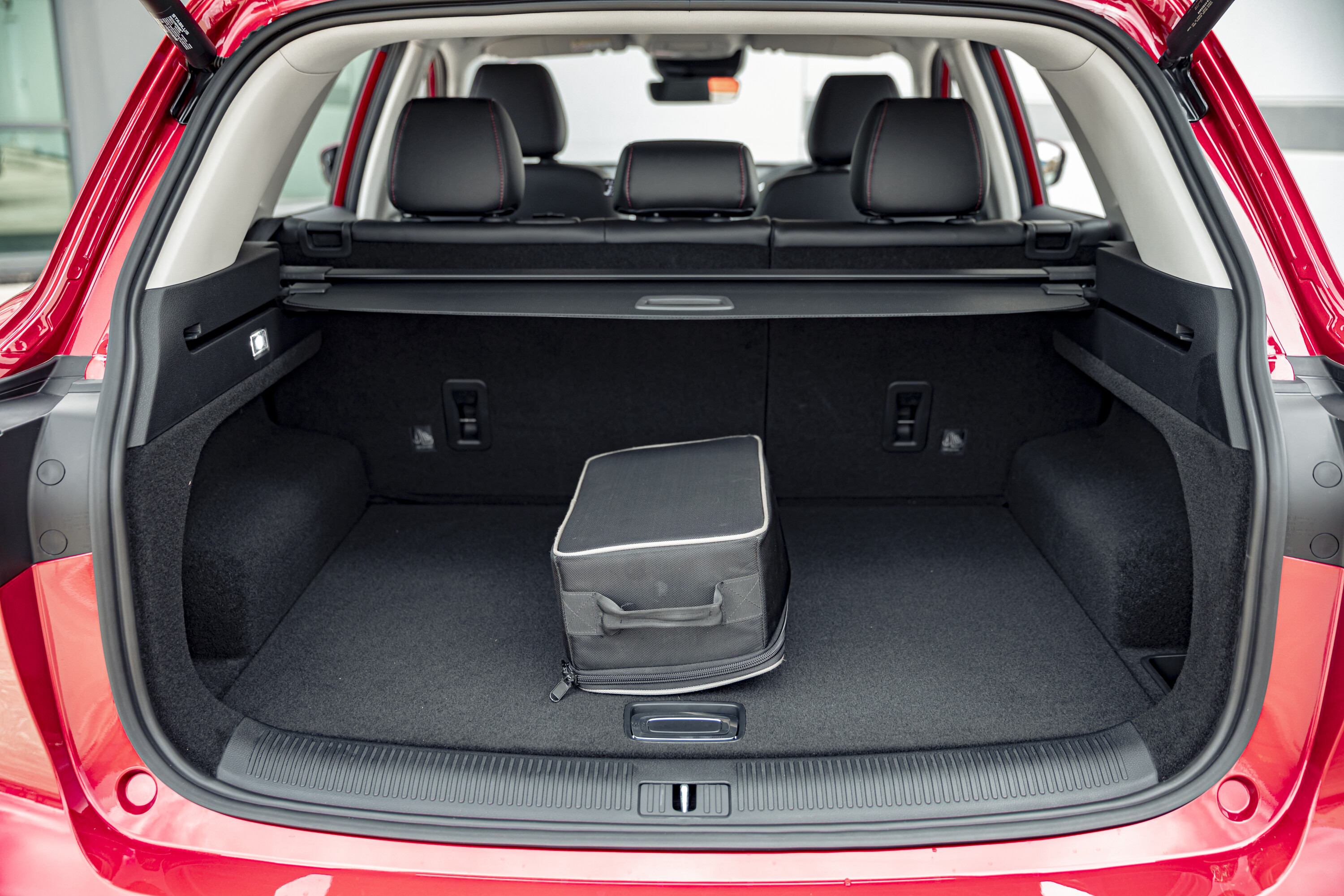
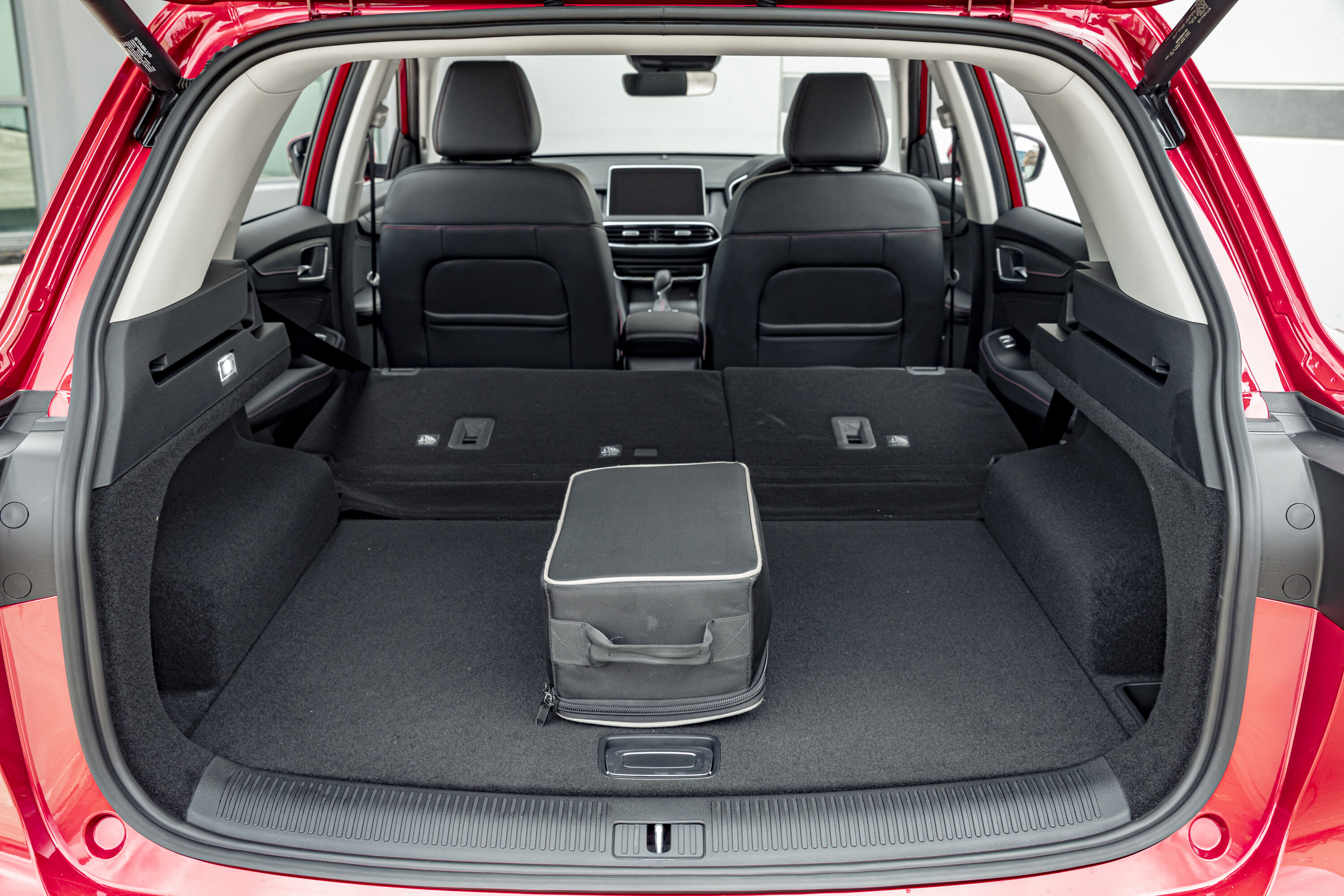
I like driving, will I enjoy the HS?
MG has delivered the goods when it comes to the features and packaging with the HS but, while it’s one of the better Chinese-built cars to arrive in Australia so far, its drive is still not quite as refined as its more established Japanese and Korean rivals.
That said, it was a big step up from the GS model it replaced, with the steering, braking and handling all as solid as they need to be in a family SUV.
Ride comfort is improved too, although some harshness on less-than-perfect surfaces betrays the need for further development work if the HS is to match the class leaders.
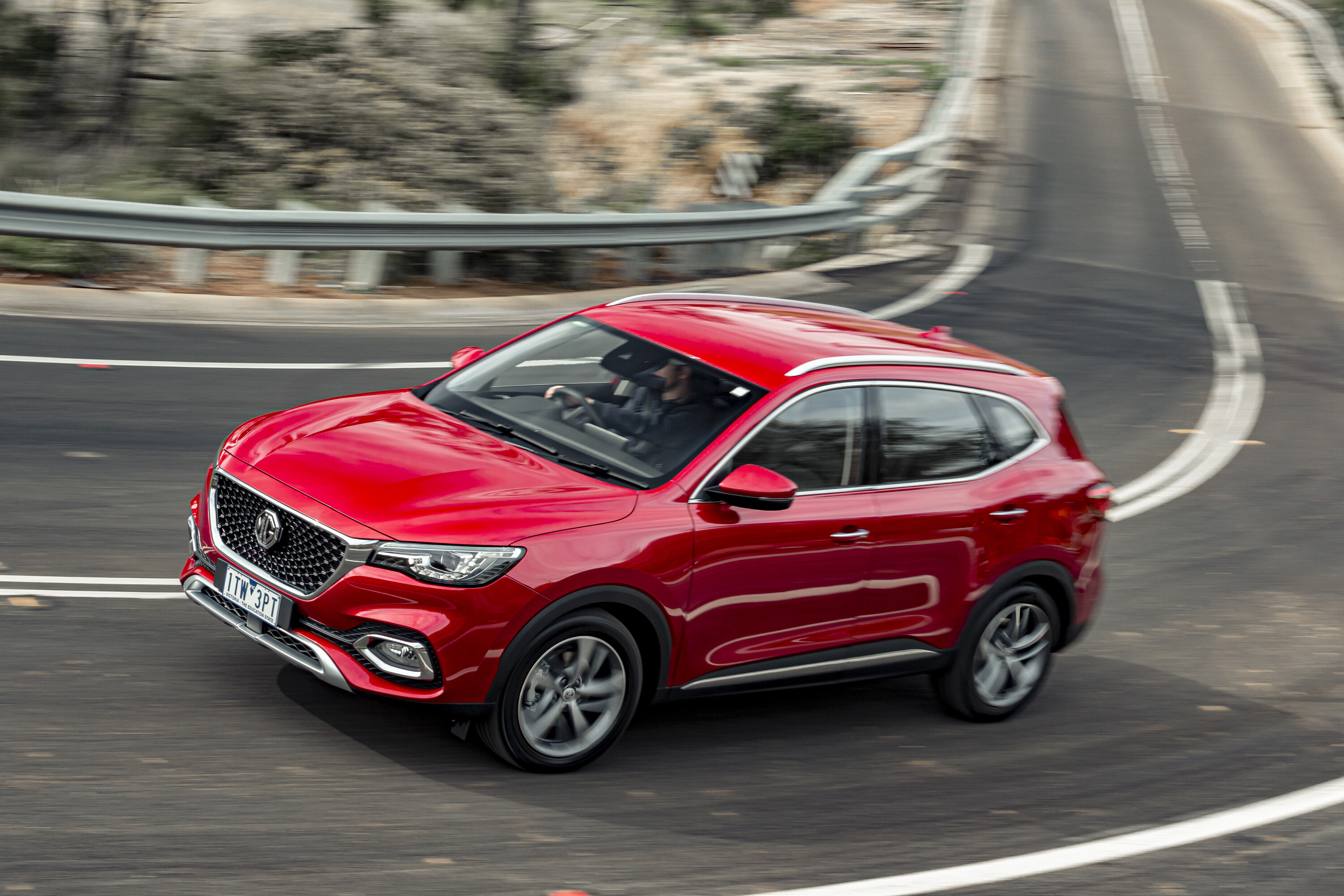
The 119kW 1.5-litre turbo-petrol engine in front-wheel-drive HS variants suffers some turbo lag off the line but provides sufficient power for a vehicle this size. It’s not too noisy and revs willingly.
Although the seven-speed dual-clutch automatic transmission can be indecisive and typically lacks polish, particularly at lower speeds, it’s preferable to the less-sophisticated continuously variable transmissions (CVT) found in rival SUVs.
The 168kW 2.0-litre turbo-petrol in the all-wheel-drive Essence X has a six-speed dual-clutch auto, which brings the same issues as the smaller engine’s seven-speed DCT.
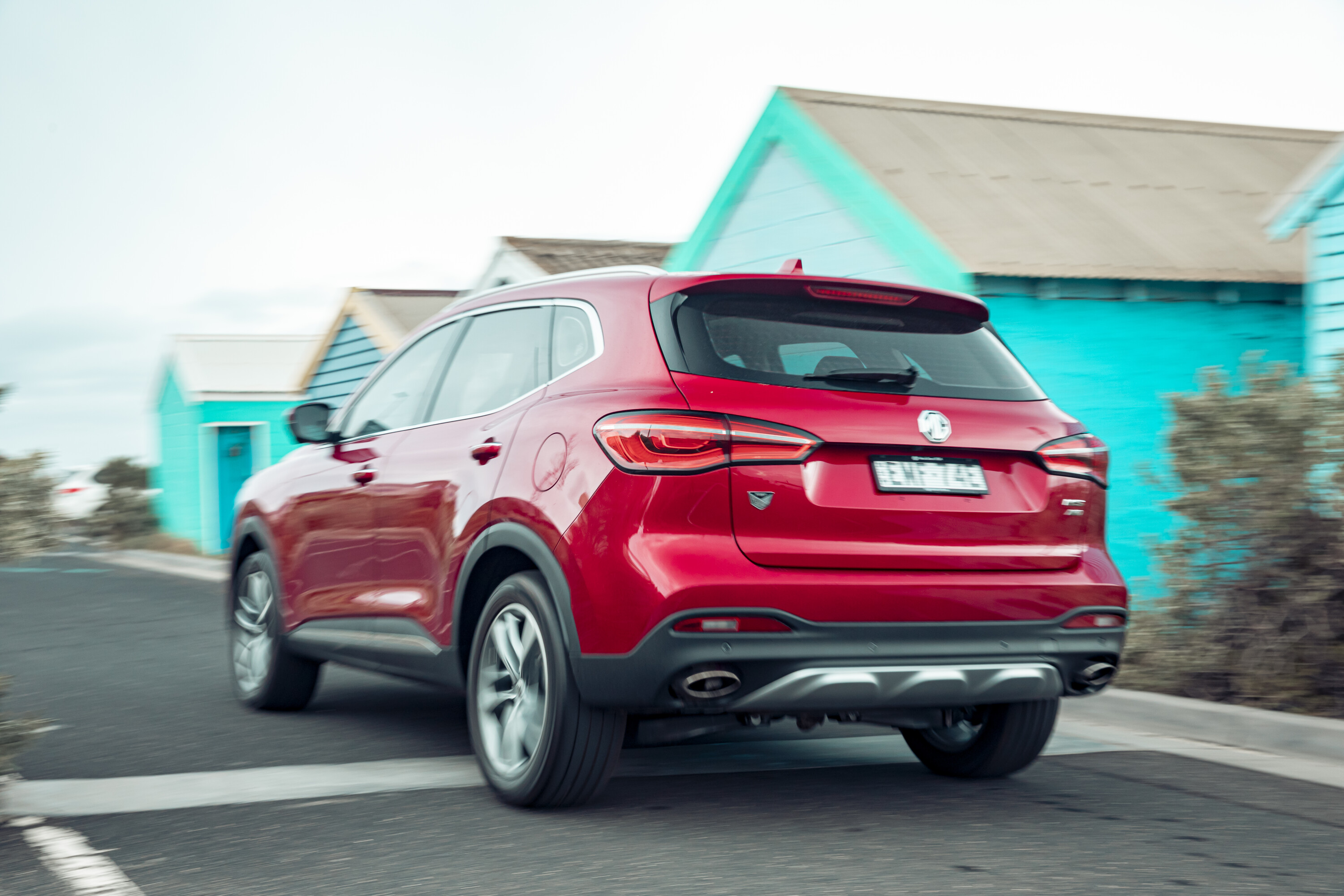
Low-speed manoeuvring is frustrating, with an extended delay between switching between forward and reverse that can allow the vehicle to roll while it’s taking time to think.
The Excite, Essence and Essence X variants allow for more engaging driving with paddle-shifters to give you more control over gear ratios, and a Super Sport drive mode that tightens the steering and boosts acceleration by allowing for higher revs between gear changes.
Plug-in hybrid Excite and Essence HS Plus EV variants feature the same 1.5L engine as front-wheel-drive variants, connected to a 90kW/230Nm electric motor and 16.6kWh lithium-ion battery pack for combined outputs of 189kW/370Nm, sent to the front wheels.
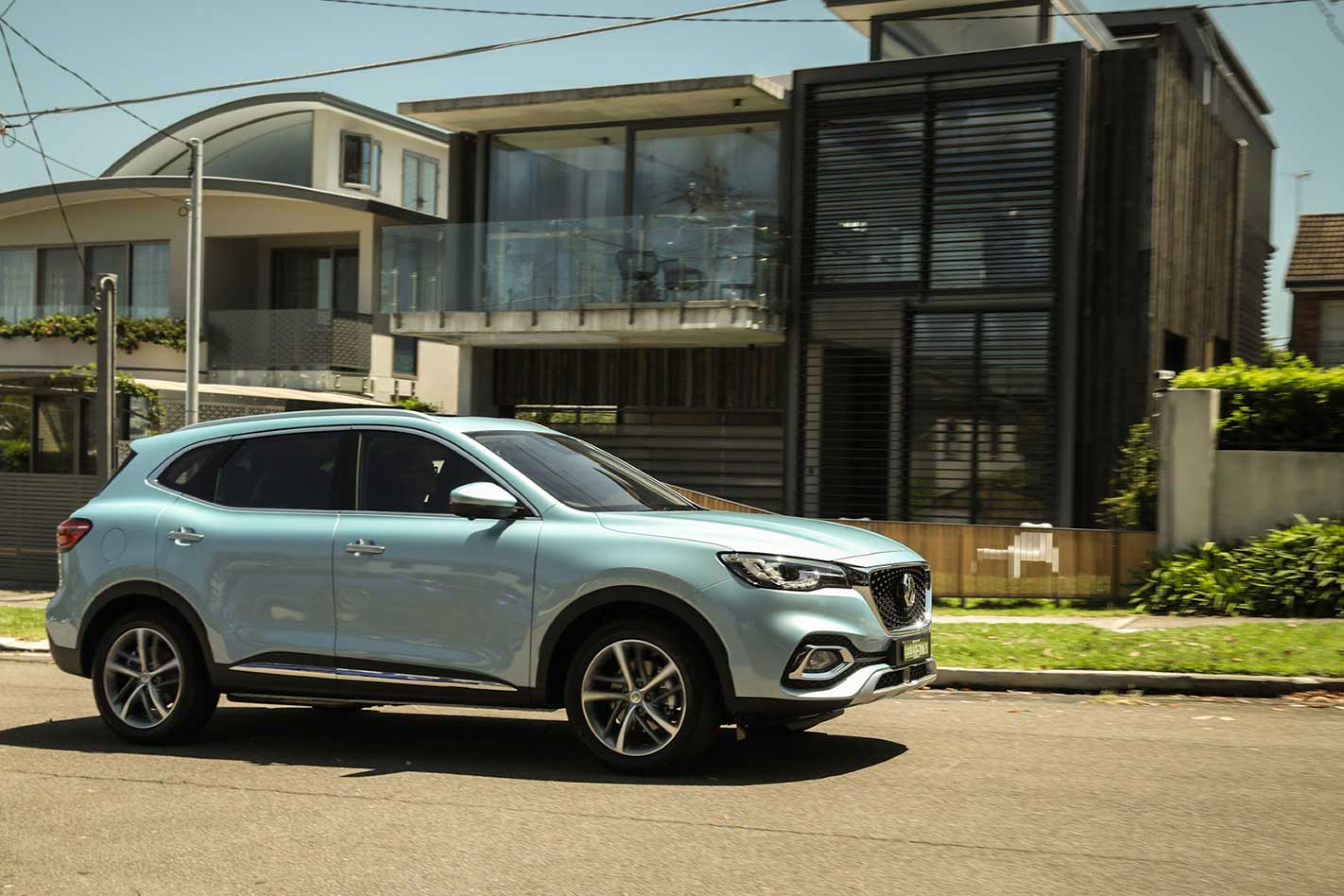
Hybrid powertrain performance is pretty good, the engine merging seamlessly with the motor and only getting loud at high revs under a wide-open throttle.
Its 10-speed automatic transmission – split between a traditional six-speed unit for the petrol engine and a four-speed electronic drive unit for the electric motor – offers smoother gear changes at low speeds than the DCT boxes.
Low-speed acceleration is sufficiently strong in Hybrid mode but on the open road, there’s often a weird hesitation when cracking open the throttle to accelerate from say, 70-110km/h, as if the transmission is caught napping and the electric motor can’t quite deploy its instant hit of torque.
Acceleration is swift in EV mode, with only a subdued whine and tyre noise disturbing the otherwise tranquil cabin, with a fair bit of wind noise around the mirrors at motorway speed.
If any of the terms in this section have left you scratching your head, these articles will help bring you up to speed!
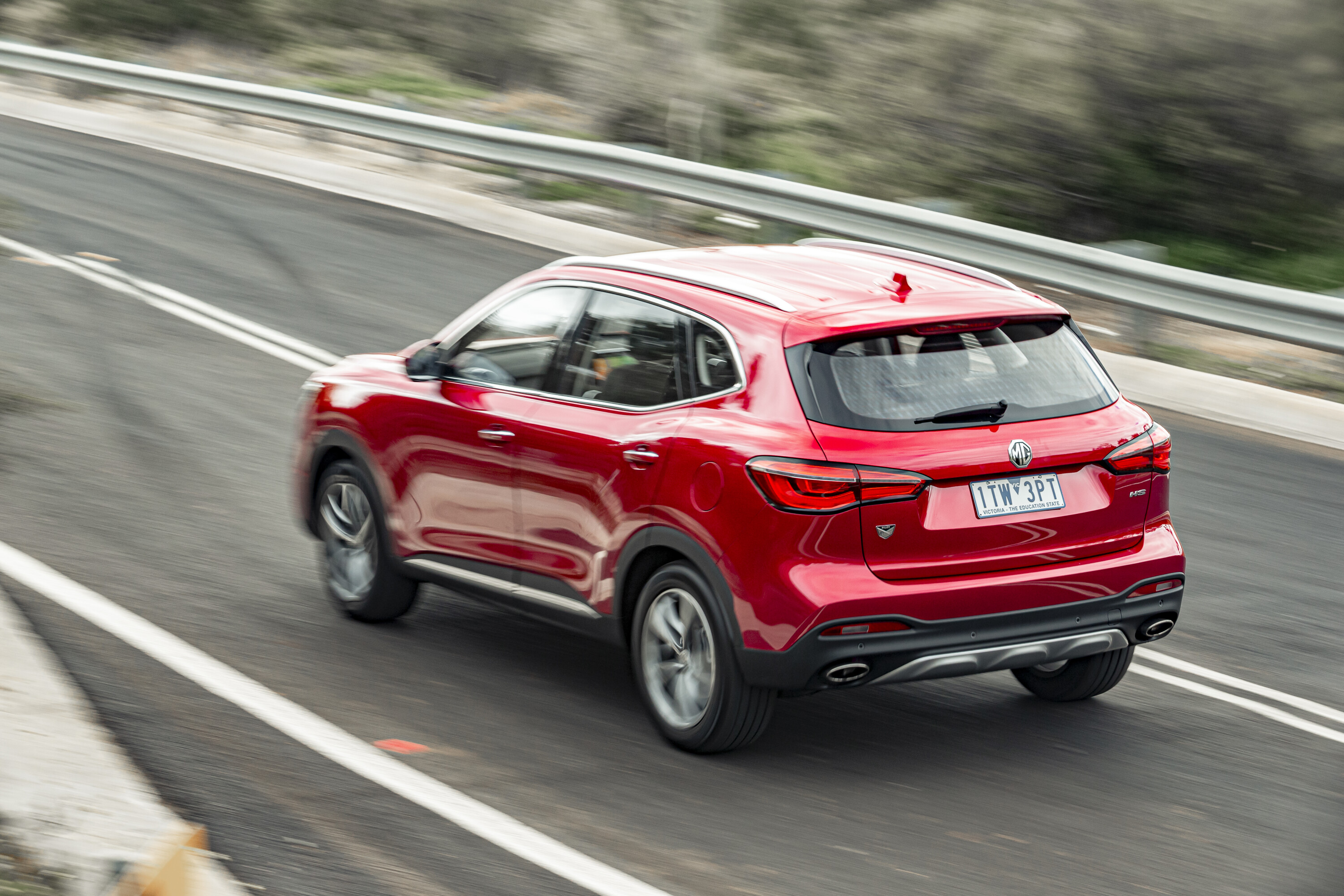
- What is a Powertrain or Drivetrain?
- Power vs torque
- Car suspension explained
- Automatic transmissions (‘gearboxes’) explained
- Chassis control systems explained
- Car vs Ute vs SUV: How the vehicle you buy should guide the way you drive
Which MG HS engine uses the least fuel?
The plug-in hybrid powertrain in the cheekily-named MG HS Plus EV has an official combined fuel consumption (urban and highway) rating of 1.7L/100km assuming you’re starting your journey with a full battery and taking advantage of EV mode.
Drive the HS hybrid on petrol only and that figure will shoot up, with the hybrid components including the motor and battery adding 225kg over the standard petrol front-wheel-drive variants.
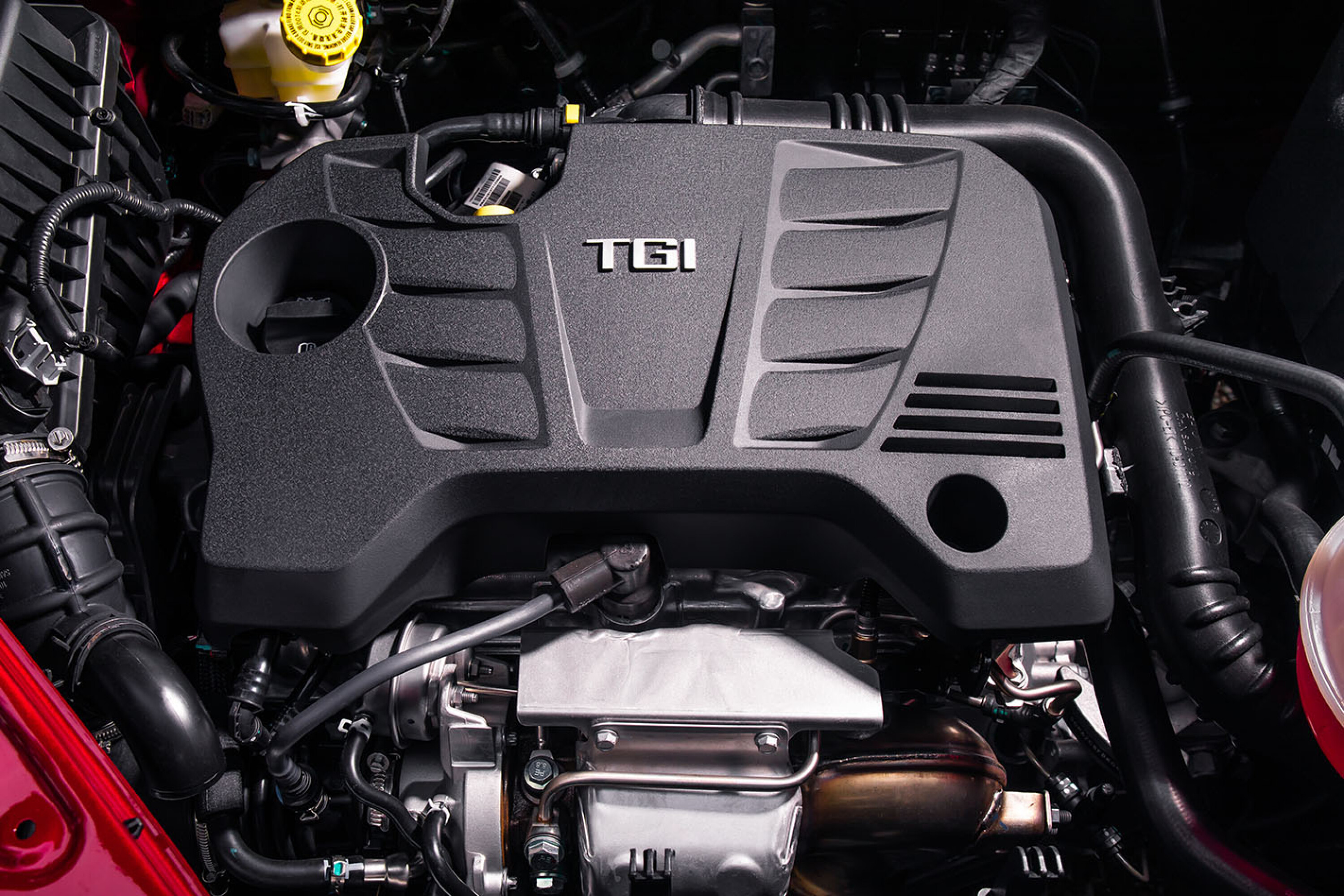
The 1.5-litre petrol engine with seven-speed dual-clutch auto consumes 7.3L/100km according to official testing.
All-wheel drive and a punchy 168kW/360Nm 2.0-litre turbocharged petrol engine with six-speed transmission conspire to make the Essence X thirstiest of all at 9.5L/100km.
Each engine is specified to run on pricier 95 or 98 RON premium petrol.
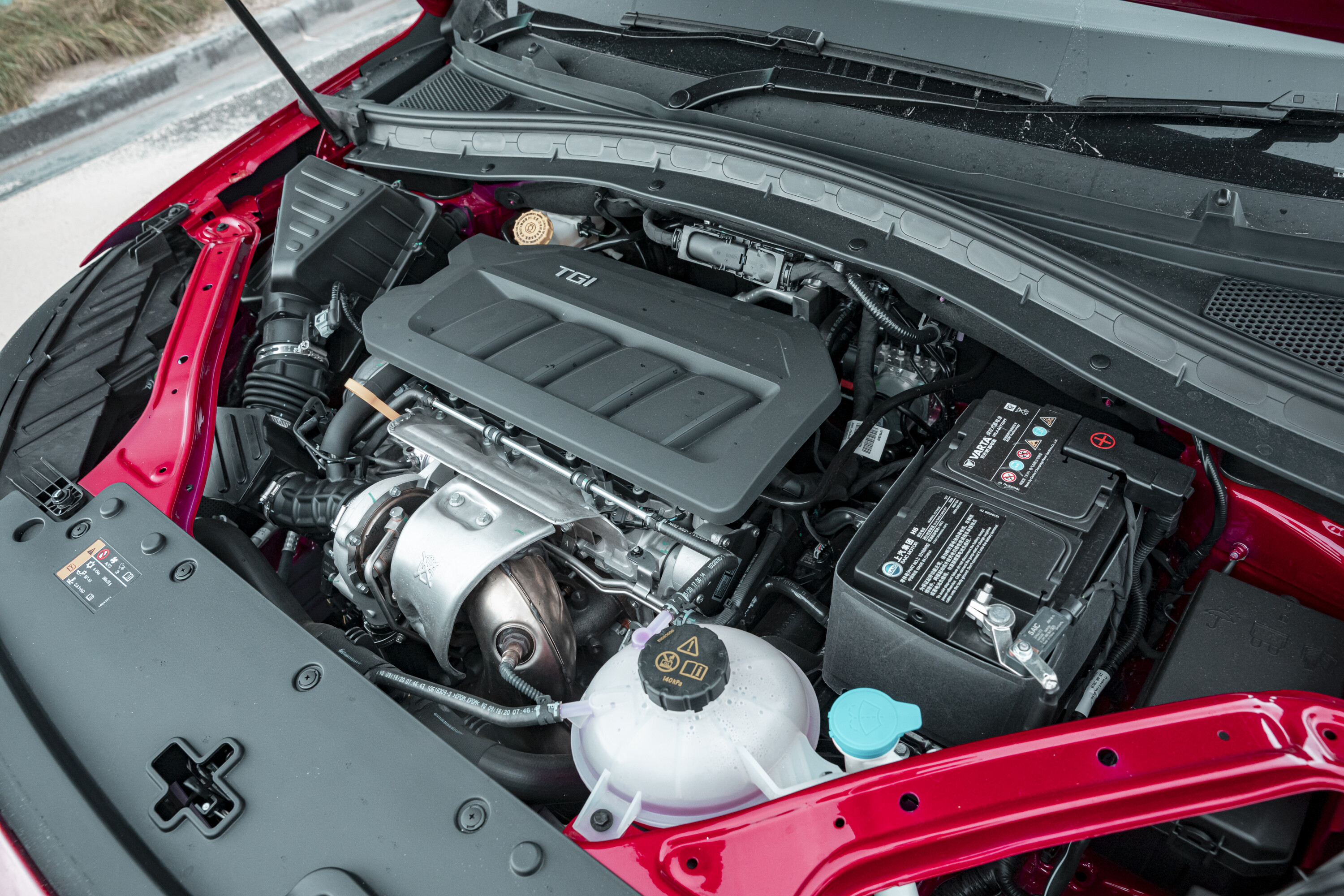
How does the hybrid system work in the MG HS?
The 119kW/250Nm 1.5-litre four-cylinder turbocharged engine is teamed with an electric motor and a 10-speed auto, split between a traditional six-speed unit for the petrol engine and a four-speed electronic drive unit for the electric motor.
Combining the engine and motor creates a maximum of 189kW and 370Nm.
The motor is fed by a 16.6kWh battery to provide a claimed electric-only range of 52km, which would allow many people to get to work and back on electrons alone.
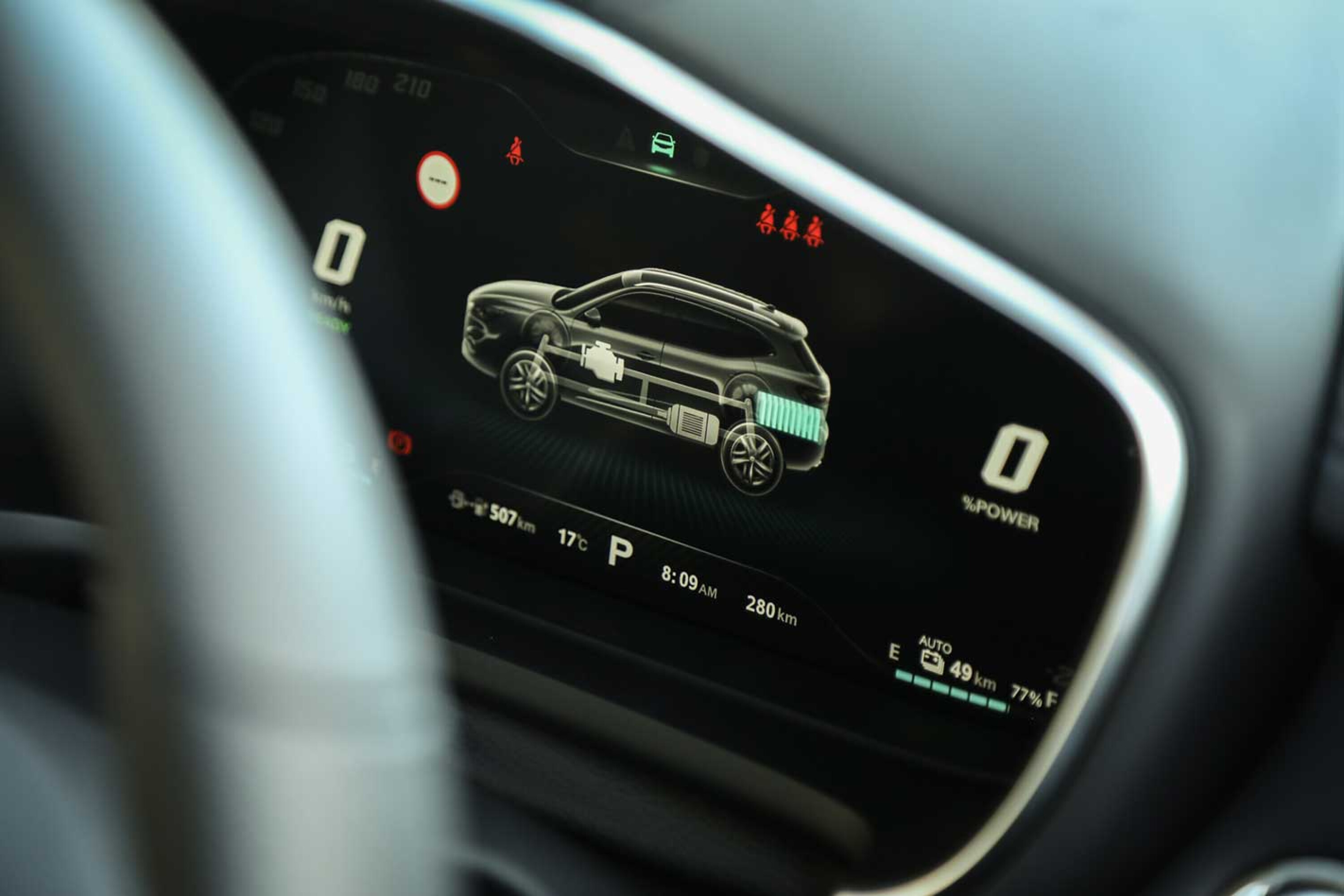
It is a relatively basic hybrid system with just two modes: EV, which locks out the petrol engine, or the default Hybrid mode, which uses a mix of petrol and battery power depending on a bunch of parameters including throttle position, road speed, and gradient.
Unlike the Mitsubishi Outlander PHEV, it lacks a ‘recharge’ mode that boosts the battery on the move for later electric-only running, instead relying on regenerative braking to replenish the battery after its plug-in charge is depleted.
Unless you’re travelling long distances downhill, this won’t be enough to charge the battery for electric-only travel beyond speeds of 30km/h.
That said, this is an honest, uncomplicated plug-in hybrid that gets enough of the basics right; easy overnight recharging from a domestic outlet, enough range for typical daily duties, and economical longer-haul running with zero range anxiety.
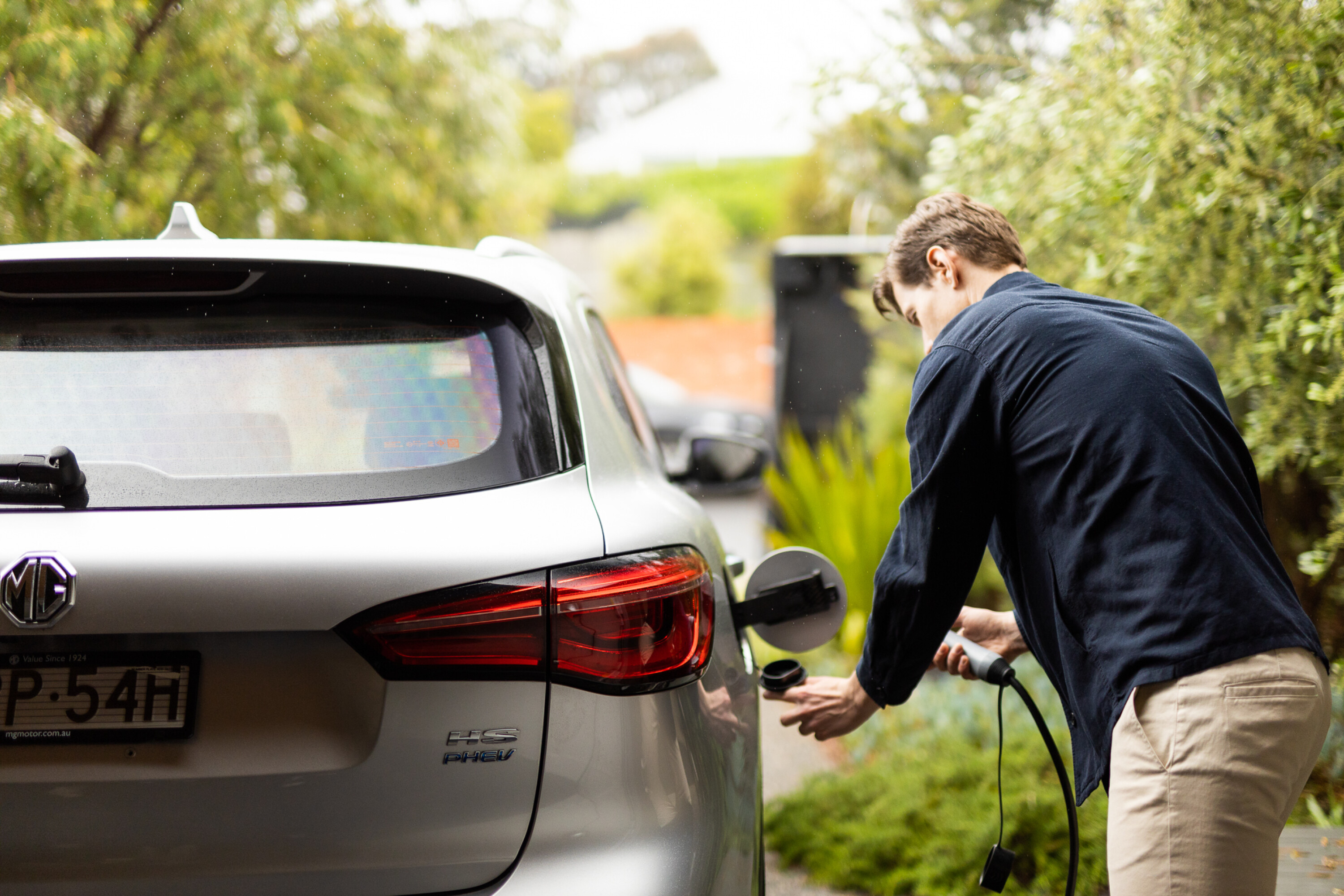
Charging is through a Type 2 plug, meaning you should have no trouble finding a suitable AC charger should you want to top up on the road. A 22kW public AC charger can top up the battery from empty in three hours.
Replenishing the battery from flat to 100 per cent charge from a standard 240-volt socket will take about seven hours, meaning you’ll have few issues with overnight charging.
MG sells single-pase 7kW and three-phase 11kW charging hubs priced at $1990 and $2090 respectively (excluding installation); using the 7kW unit gets the full charging time down to five hours.
| 2024 MG HS efficiency | |
|---|---|
| Electric-only driving range | 52 km |
| Combined fuel consumption | 1.7L/100km |
| CO2 emissions (combined) | 39g/km |
| Charging time 2.4kW (240v) | 7 hours |
| Charging time 7kW | 5 hours |
| Charging time 22kW | 3 hours |
How much can an MG HS tow?
All MG HS variants, including the hybrids, have a 1500kg maximum braked towing capacity, which is enough to safely tow small to medium caravans, trailers and boats.
They can tow unbraked loads of up to 750kg.
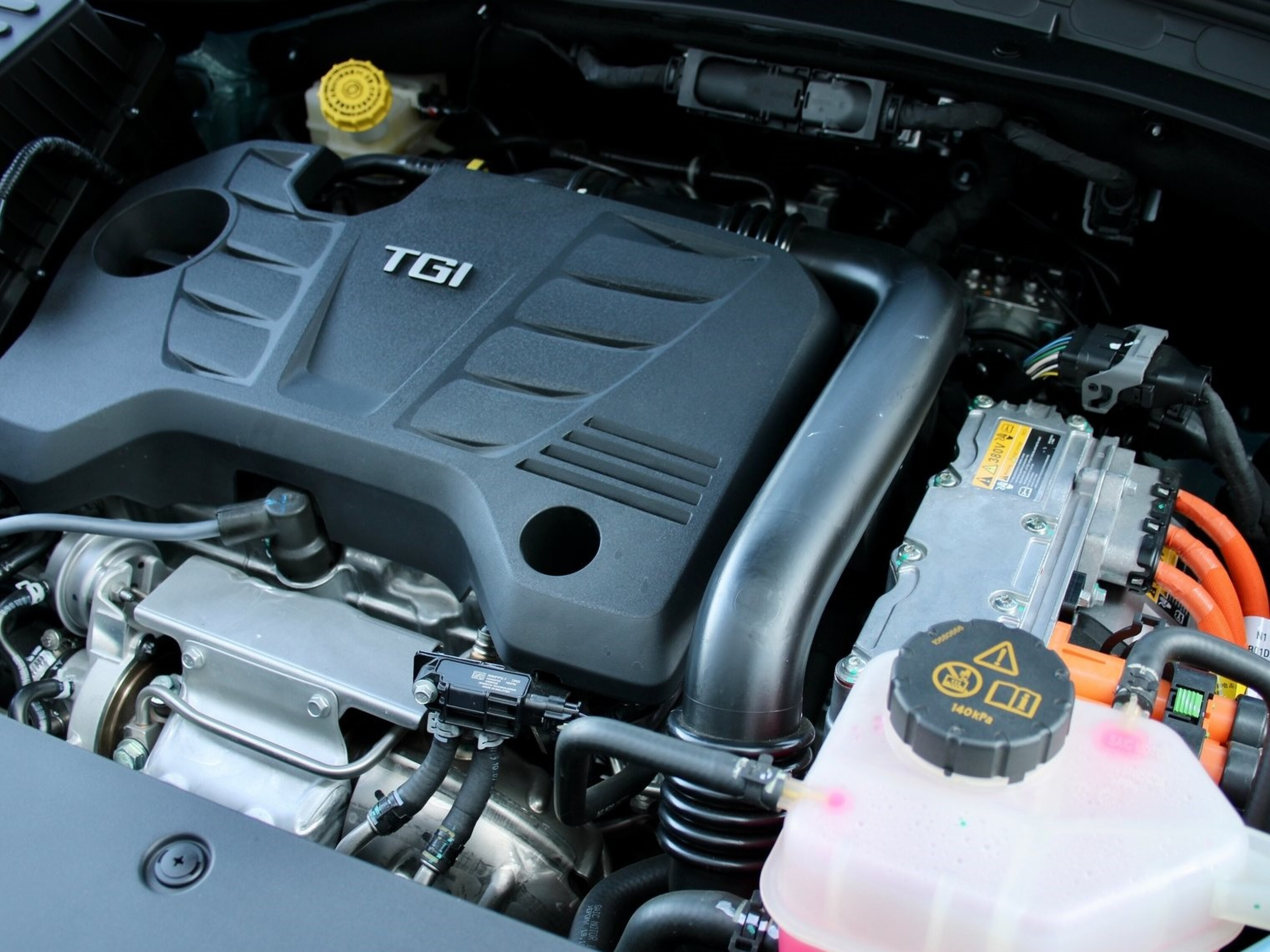
How long is the warranty and what are the MG HS’s servicing costs?
The MG HS is covered by the brand’s seven-year/unlimited-kilometre warranty – which also covers the hybrid’s battery – along with complimentary roadside assistance during the warranty period.
Service intervals are a short 10,000km or 12 months, with MG offering capped-price servicing or seven years across the HS range.
| Service interval | Price Petrol/PHEV |
|---|---|
| 10,000km/12 months | $279/$279 |
| 20,000km.24 months | $345/$399 |
| 30,000km/36 months | $332/$279 |
| 40,00km/48 months | $403/$456 |
| 50,000km/60 months | $279/$279 |
| 60,000km/72 months | $845/$1012 |
| 70,000km/84 months | $279/$279 |
MG rewards customers who service their vehicle at an authorised service centre with an extra year of free roadside assistance.
Which version of the MG HS does Wheels recommend?
The Vibe and Excite are excellent value for around the $30,000 mark, but we reckon the FWD petrol Excite has more than enough extras to justify the additional cost – its sub-$40,000 drive-away price tag represents pretty good value.
Plug-in hybrid variants are also good value if you generally travel short distances and can keep the battery charged.
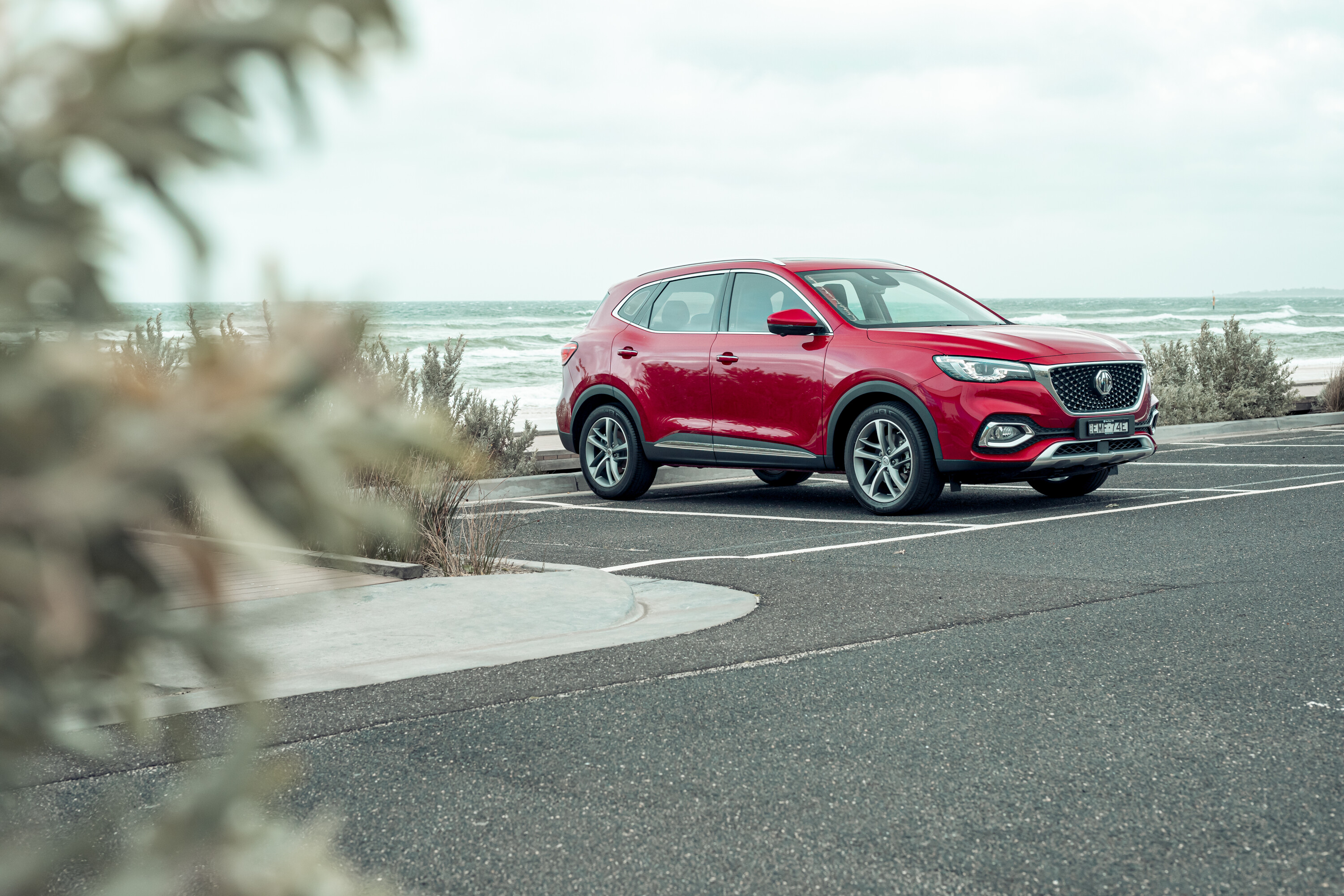
What are the MG HS’s main rivals?
The Haval H6 and SsangYong Korando are other options if seeking a plushly equipped medium SUV priced below $40,000.
You might also cross-shop the HS against lower-spec variants of popular Japanese and Korean alternatives such as:
Electrified medium SUV rivals to the HS Plus EV include the RAV4 hybrid and Mitsubishi Outlander PHEV, though the slightly smaller Mitsubishi Eclipse Cross comes closer in terms of pricing.
More guides to help you choose the best car & tyres for your needs
- All tyre news & reviews
- Longest warranties & capped-price servicing period
- Buy new or used?
- Best cars for your teenager
- Must-have features for new drivers
- Active safety tech explained
- Australian road rules explained
- Does driving slower save fuel?
- Does my car need the pricier fuel?
- Help, I’ve used the wrong fuel!
- What is a hybrid car?
- How long do tyres last?
- What shoes should I wear to drive?
- What to do after buying a new car
- How much does LCT add to a car’s price?
- The ‘check engine’ light just came on…
- Is it illegal to drive too slowly in Oz?
- FWD v RWD v AWD – which is safer?
- How much can my large SUV tow?
Score breakdown
Things we like
- Well equipped for the price
- Pleasing interior materials
- Willing turbocharged engine
- Australia's most affordable PHEV
Not so much
- Laggy dual-clutch auto
- Not-so-refined ride and handling
- Fiddly touchscreen controls
- Thirsty all-wheel-drive variant

